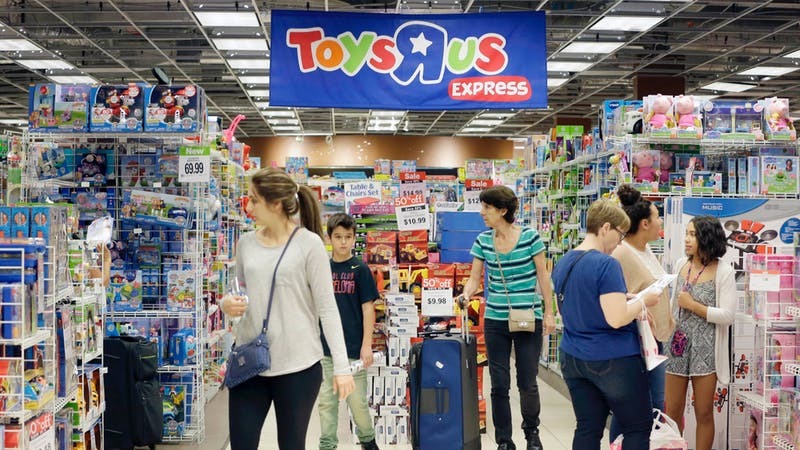
Toys R Us has put forward plans to close at least a third of its UK stores, putting up to 800 jobs at risk.
The retailer said it is working on a company voluntary agreement (CVA), which would allow it to jettison 26 loss-making stores.
Four Scottish stores are on the list, with branches in Aberdeen, Kirkcaldy, Livingston and East Kilbride set to be closed.
All branches will remain open through Christmas and into the new year, but there remains uncertainty over the future of the company’s other Scottish outlets.
The 26 stores earmarked for closure in 2018
Aberdeen
Basingstoke
Belfast, Newtownabbey
Birmingham, St Andrews
Bolton
Bradford
Brislington
Cambridge
Cardiff
Derry City
Doncaster
East Kilbride
Exeter
Hayes
Kirkcaldy
Leicester
Livingston
Manchester, Central Retail Park
Old Kent Road
Plymouth
Scunthorpe
Shrewsbury
Tamworth
Tunbridge Wells
Watford
York
The firm said the transformation plan is needed to “meet the evolving needs of customers in today’s UK retail market”.
It is understood that 500 to 800 jobs could be lost as part of the CVA process, as the company expects that it will be required to make redundancies.
The retailer said that all efforts will be made to redeploy team members where possible.
Toys R Us, which trades from 84 stores in the UK and has 21 concessions, employs a total of 3,200 people, but the company assured that there will be “no disruption for customers” throughout the Christmas and New Year shopping period, with the business set to start closing stores in Spring 2018.
Steve Knights, managing director of Toys R Us UK, said the warehouse-style stores opened by the retailer in the 1980s and 1990s have proven “too big and expensive to run”, adding that “newer, smaller, more interactive stores in the right shopping locations” were trading well.
He also pointed to a “significant growth” in online sales and its click-and-collect offering.
“Like many UK retailers in today’s market environment, we need to transform our business so that we have a platform that can better meet customers’ evolving needs.
“The decision to propose this CVA was a difficult one, but we determined it is the best path forward to make essential changes to the business,” Mr Knights said.
As part of the CVA process, Toys R Us UK has submitted its restructuring plan to creditors, with hopes of gaining approval within the next 17 days.
If approved, Toys R Us UK would see its rental obligations “substantially reduce”, and allow it to move forward with a “new, viable business model” that would include a raft of store closures.
The announcement comes just months after the US-based retailer filed for bankruptcy protection in the US and Canada as it battled mammoth debts and increasing competition online.
The private equity-owned company has suffered falling like-for-like sales, with analysts saying it has failed to aggressively build up its online business and lost sales to competitors like Amazon.
The toy retailer has struggled with debt since private-equity firms Bain Capital, KKR & Co and Vornado Realty Trust took it private in a $6.6 billion buyout in 2005, with experts saying that high levels of borrowing have held the group back from investing in its business.
The company – which dates back to the 1950s – was being lined up for a stock market flotation, but the plans were scuppered by weak financial performance.
Toys R Us arrived in the UK in 1985 with just five stores, launching its regional website 11 years later in 1996.

Enjoy the convenience of having The Sunday Post delivered as a digital ePaper straight to your smartphone, tablet or computer.
Subscribe for only £5.49 a month and enjoy all the benefits of the printed paper as a digital replica.
Subscribe